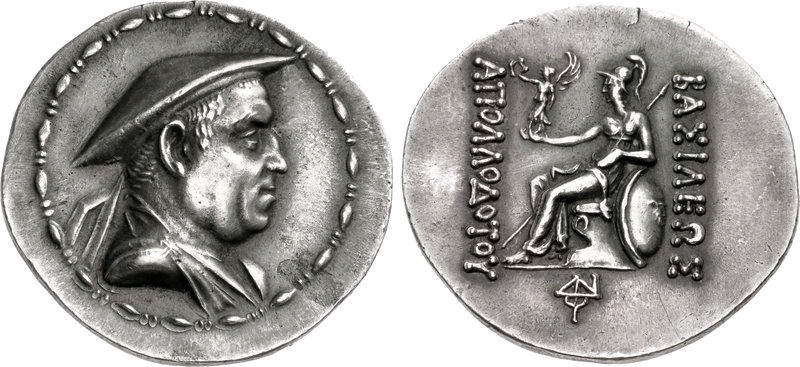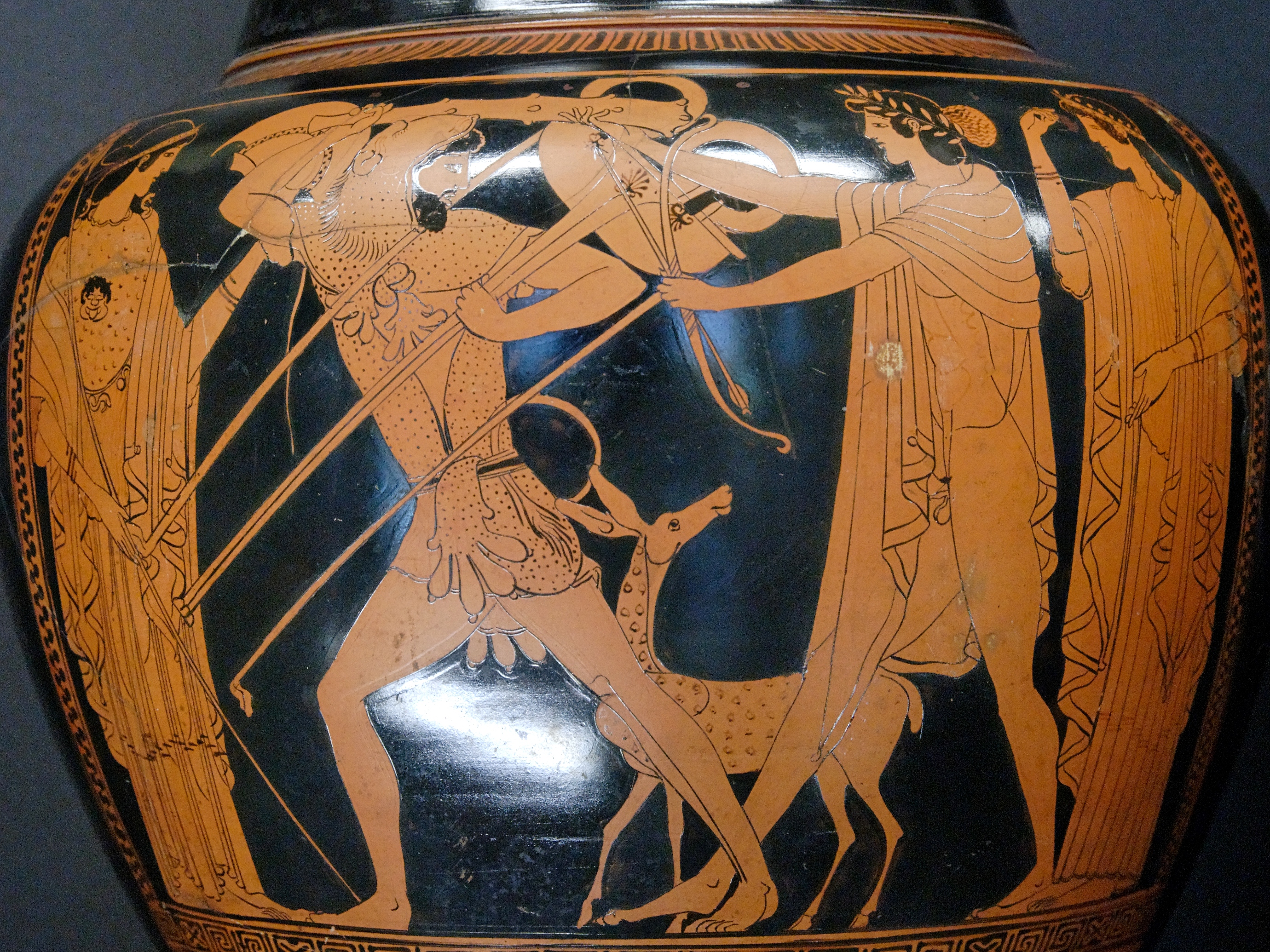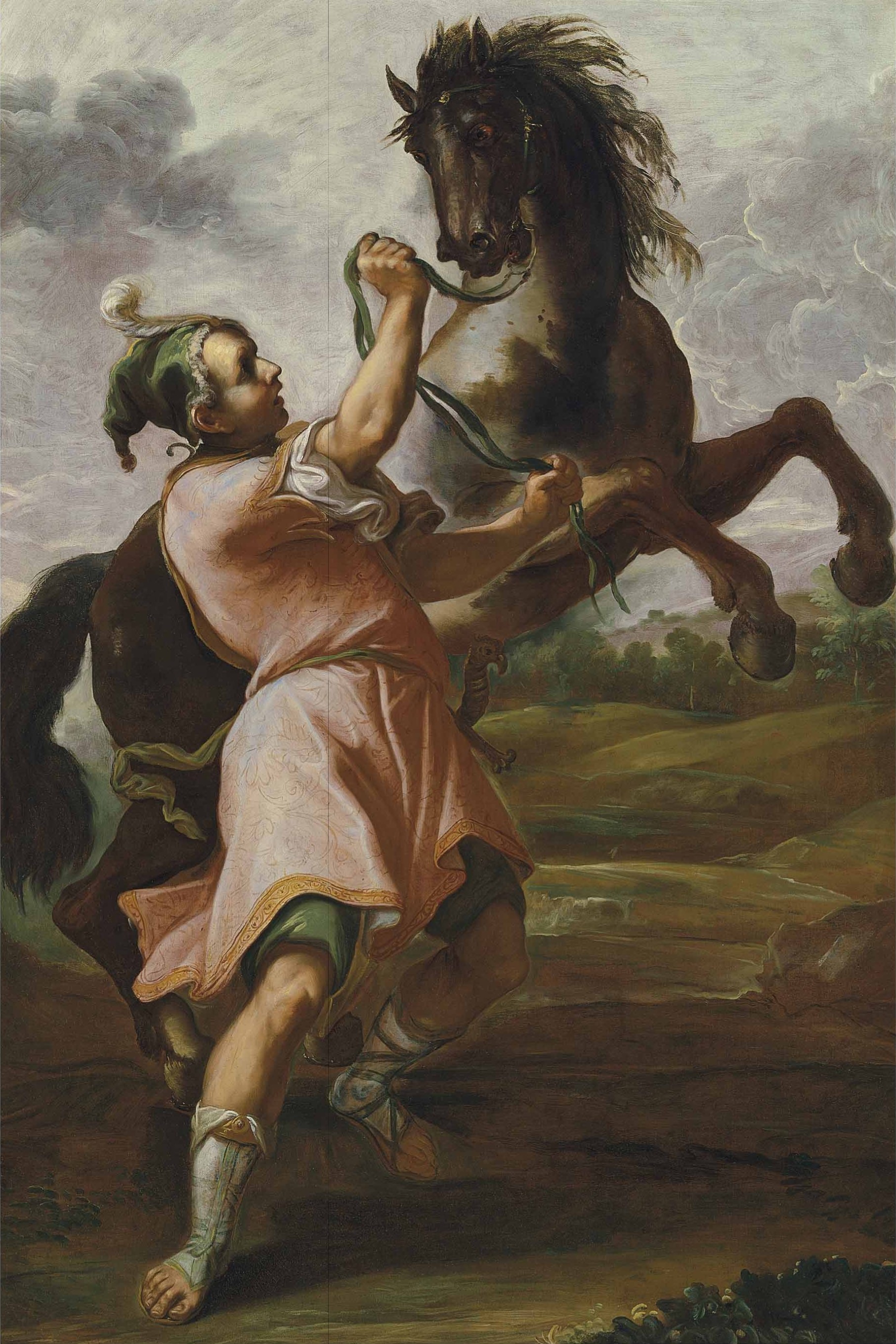|
Apollodotus II
Apollodotus II (Greek: ) was an Indo-Greek king who ruled in the western and eastern parts of Punjab. Bopearachchi dates him to c. 80–65 BC, and R. C. Senior to c. 85–65 BC. Apollodotos II was an important ruler who seems to have re-established the Indo-Greek kingdom to some extent of its former glory. Taxila in western Punjab was reconquered from nomad Scythian rule. Rule Apollodotus II seems to have been a member of the dynasty of Menander I, since he used their typical deity Athena Alkidemos on most of his silver, and also Menander's title ''Soter'' (Greek: , "the Saviour"), on all his coins. On some coins, he also calls himself ''Philopator'' (Greek: , "the father-loving"), which proves that his father had been king before him. R C Senior guesses that Amyntas or Epander could have been his father. Apollodotus' reign possibly began in the Punjab, when the Scythian king Maues ruled in Gandhara and its capital Taxila. What probably happened is that Apollodotus II took ove ... [...More Info...] [...Related Items...] OR: [Wikipedia] [Google] [Baidu] |
Indo-Greek
The Indo-Greek Kingdom, or Graeco-Indian Kingdom, also known historically as the Yavana Kingdom (Yavanarajya), was a Hellenistic-era Greek kingdom covering various parts of Afghanistan and the northwestern regions of the Indian subcontinent (parts of modern-day Pakistan and northwestern India). This kingdom was in existence from ca. 200 BC to ca. 1 BC. During its existence the kingdom was ruled over by 30 successive kings. Menander I, being the most well known amongst the Indo-Greek kings, is often referred to simply as ''“Menander,”'' despite the fact that there was indeed another Indo-Greek King known as Menander II. Menander I's capital was at Sagala in the Punjab (present-day Sialkot). The kingdom was founded when the Graeco-Bactrian king Demetrius (and later Eucratides) invaded India from Bactria in 200 BC. The Greeks in the Indian Subcontinent were eventually divided from the Graeco-Bactrians centered on Bactria (now the border between Afghanistan and Uzbe ... [...More Info...] [...Related Items...] OR: [Wikipedia] [Google] [Baidu] |
Artemidorus
Artemidorus Daldianus ( grc-gre, Ἀρτεμίδωρος ὁ Δαλδιανός) or Ephesius was a professional diviner who lived in the 2nd century AD. He is known from an extant five-volume Greek work, the '' Oneirocritica'' or ''Oneirokritikon'' ( en, The Interpretation of Dreams)."Artemidorus Daldianus" in ''The New Encyclopædia Britannica''. Chicago: Encyclopædia Britannica Inc., 15th edn., 1992, Vol. 1, p. 599. Life and work Artemidorus was surnamed ''Ephesius'', from Ephesus, on the west coast of Asia Minor, but was also called ''Daldianus,'' from his mother's native city, Daldis in Lydia. He lived in the 2nd century AD. According to Artemidorus, the material for his work was gathered during lengthy travels through Greece, Italy and Asia, from diviners of high and low station. Another major source were the writings of Artemidorus' predecessors, sixteen of whom he cites by name. It is clear he built on a rich written tradition, now otherwise lost. Artemidorus' method is, ... [...More Info...] [...Related Items...] OR: [Wikipedia] [Google] [Baidu] |
Hippostratos
Hippostratus ( grc, Ἱππόστρατος, Hippostratos) was an Indo-Greek king who ruled central and north-western Punjab and Pushkalavati. Bopearachchi dates Hippostratus to 65 to 55 BCE whereas R. C. Senior suggests 60 to 50 BCE. Rule In Bopearachchi's reconstruction Hippostratus came to power as the successor to Apollodotus II, in the western part of his kingdom, while the weak Dionysius ascended to the throne in the eastern part. Senior assumes that the reigns of Apollodotus II and Hippostratos overlapped somewhat; in that case Hippostratus first ruled a kingdom situated to the west of Apollodotus' dominions. Just like Apollodotus II, Hippostratus calls himself ''Soter'', "Saviour", on all his coins, and on some coins he also assumes the title ''Basileos Megas'', "Great King", which he inherited from Apollodotus II. This may support Senior's scenario that Hippostratus extended his kingdom after Apollodotus' death. The relationship between these two kings remains uncerta ... [...More Info...] [...Related Items...] OR: [Wikipedia] [Google] [Baidu] |
King Dionysios
Dionysius Soter ( grc, Διονύσιος Σωτήρ, Dionysios Sōtēr; epithet means "the Saviour") was an Indo-Greek king in the area of eastern Punjab. Reign According to Osmund Bopearachchi, he reigned c. 65–55 BCE and inherited the eastern parts of the kingdom of the important late ruler Apollodotus II. The kings share the same epithet and use the common reverse of fighting Pallas Athene, and it seems plausible that they were closely related, but relationships between the last Indo-Greek kings remain uncertain since the only sources of information are their remaining coins. R. C. Senior dates him approximately ten years later. Earlier scholars like Professor Ahmad Hasan Dani have dated Dionysius much earlier, between the years 115 and 100 BCE, making him the ruler of the Swat and Dir Valleys and the weak successor of Polyxenus. Dionysios was probably pressured by the invasions of the Indo-Scythians, and also had to deal with Hippostratus, a more important king who had ... [...More Info...] [...Related Items...] OR: [Wikipedia] [Google] [Baidu] |
Indo-Scythian
Indo-Scythians (also called Indo-Sakas) were a group of nomadic Iranian peoples of Scythian origin who migrated from Central Asia southward into modern day Pakistan and Northwestern India from the middle of the 2nd century BCE to the 4th century CE. The first Saka king of India was Maues/Moga (1st century BCE) who established Saka power in Gandhara, Pakistan and the Indus Valley. The Indo-Scythians extended their supremacy over north-western India, conquering the Indo-Greeks and other local kingdoms. The Indo-Scythians were apparently subjugated by the Kushan Empire, by either Kujula Kadphises or Kanishka. Yet the Saka continued to govern as satrapies, forming the Northern Satraps and Western Satraps. The power of the Saka rulers started to decline in the 2nd century CE after the Indo-Scythians were defeated by the Satavahana emperor Gautamiputra Satakarni. Indo-Scythian rule in the northwestern Indian subcontinent ceased when the last Western Satrap Rudrasimha III wa ... [...More Info...] [...Related Items...] OR: [Wikipedia] [Google] [Baidu] |
Zoilos II
Zoilus II Soter ( grc, Ζωΐλος Σωτήρ, Zōïlos Sōtēr; epithet means "the Saviour") was an Indo-Greek king who ruled in eastern Punjab. Bopearachchi dates his reign to c. 55–35 BC, a date approximately supported by R. C. Senior. It is possible that some of his coins were issued by a separate king, Zoilus III. Rule Zoilus seems to have been one of the rulers who succeeded the last important Indo-Greek king Apollodotus II in the eastern parts of his former kingdom. All these kings use the same symbol as Apollodotus II, the fighting Pallas Athene introduced by Menander I, and usually also the same epithet ''Soter'' (Saviour). It is therefore possible that they belonged to the same dynasty, and Zoilus II could also have been related to the earlier king Zoilus I, but the lack of written sources make all such conjections uncertain. He may have been the Bactrian ally of Mark Antony and Cleopatra VII referred to by Virgil in his vision of the Battle of Actium in : ... [...More Info...] [...Related Items...] OR: [Wikipedia] [Google] [Baidu] |
Apollodotus I
Apollodotus I ( Greek: ) Prakrit in the Kharoshti script: ''maharajasa apaladatasa tratarasa'') was an Indo-Greek king between 180 BC and 160 BC or between 174 and 165 BC (first dating Osmund Bopearachchi and R. C. Senior, second dating Boperachchi) who ruled the western and southern parts of the Indo-Greek kingdom, from Taxila in Punjab to the areas of Sindh and possibly Gujarat. Ruler of the Indo-Greek kingdom Apollodotus was not the first to strike bilingual coins outside Bactria, but he was the first king who ruled in India only, and therefore the founder of the proper Indo-Greek kingdom. According to W. W. Tarn, Apollodotus I was one of the generals of Demetrius I of Bactria, the Greco-Bactrian king who invaded northwestern India after 180 BC. Tarn was uncertain whether he was a member of the royal house. It is possible he was an illegitimate son of Euthydemus, making him Demetrius’ half brother. Later authors largely agree with Tarn's analysis, though wit ... [...More Info...] [...Related Items...] OR: [Wikipedia] [Google] [Baidu] |
Sacrificial Tripod
A sacrificial tripod, whose name comes from the Greek meaning "three-footed", is a three-legged piece of religious furniture used in offerings and other ritual procedures. This ritual role derives from its use as a simple support for a cooking vessel placed over a fire. As a seat or stand, the tripod is the most stable furniture construction for uneven ground, hence its use is universal and ancient. Tripods had two types and several functions. Firstly, some oracles sat on large tripods to pronounce. Far more common were the tripods and bowls in which smaller sacrifices were burnt. These are particularly associated with Apollo and the Delphic oracle in ancient Greece. These were also given to temples as votive offerings, awarded as prizes in contests associated with religious festivals, and just given as gifts between individuals. Ancient Greece The most famous tripod of ancient Greece was the Delphic Tripod on which the Pythian priestess took her seat to deliver the oracles o ... [...More Info...] [...Related Items...] OR: [Wikipedia] [Google] [Baidu] |
Apollo
Apollo, grc, Ἀπόλλωνος, Apóllōnos, label=genitive , ; , grc-dor, Ἀπέλλων, Apéllōn, ; grc, Ἀπείλων, Apeílōn, label= Arcadocypriot Greek, ; grc-aeo, Ἄπλουν, Áploun, la, Apollō, la, Apollinis, label=genitive, , ; , is one of the Olympian deities in classical Greek and Roman religion and Greek and Roman mythology. The national divinity of the Greeks, Apollo has been recognized as a god of archery, music and dance, truth and prophecy, healing and diseases, the Sun and light, poetry, and more. One of the most important and complex of the Greek gods, he is the son of Zeus and Leto, and the twin brother of Artemis, goddess of the hunt. Seen as the most beautiful god and the ideal of the ''kouros'' (ephebe, or a beardless, athletic youth), Apollo is considered to be the most Greek of all the gods. Apollo is known in Greek-influenced Etruscan mythology as ''Apulu''. As the patron deity of Delphi (''Apollo Pythios''), Apollo is an o ... [...More Info...] [...Related Items...] OR: [Wikipedia] [Google] [Baidu] |
Bucephalus
Bucephalus or Bucephalas (; grc, Βουκεφάλας, ; – June 326 BC) was the horse of Alexander the Great, and one of the most famous horses of classical antiquity. Ancient historical accounts state that Bucephalus' breed was that of the "best Thessalian strain", and that he died in what is now Punjab, Pakistan, after the Battle of the Hydaspes in 326 BC. The horse was reportedly buried at Jalalpur Sharif, a small town situated a short distance to the southwest of Jhelum. Another account states that Bucephalus is buried in Phalia, a town located near the city of Mandi Bahauddin, which was named after him ( Alexandria Bucephalous). Bucephalus was named after a branding mark depicting an ox's head on his haunch. Taming of Bucephalus A massive creature with a massive head, Bucephalus is described as having a black coat with a large white star on his brow. He is also supposed to have had a " wall eye" (blue eye) , and his breeding was that of the "best ... [...More Info...] [...Related Items...] OR: [Wikipedia] [Google] [Baidu] |
Alexander The Great
Alexander III of Macedon ( grc, Ἀλέξανδρος, Alexandros; 20/21 July 356 BC – 10/11 June 323 BC), commonly known as Alexander the Great, was a king of the ancient Greek kingdom of Macedon. He succeeded his father Philip II to the throne in 336 BC at the age of 20, and spent most of his ruling years conducting a lengthy military campaign throughout Western Asia and Egypt. By the age of thirty, he had created one of the largest empires in history, stretching from Greece to northwestern India. He was undefeated in battle and is widely considered to be one of history's greatest and most successful military commanders. Until the age of 16, Alexander was tutored by Aristotle. In 335 BC, shortly after his assumption of kingship over Macedon, he campaigned in the Balkans and reasserted control over Thrace and Illyria before marching on the city of Thebes, which was subsequently destroyed in battle. Alexander then led the League of Corinth, and used his authori ... [...More Info...] [...Related Items...] OR: [Wikipedia] [Google] [Baidu] |









